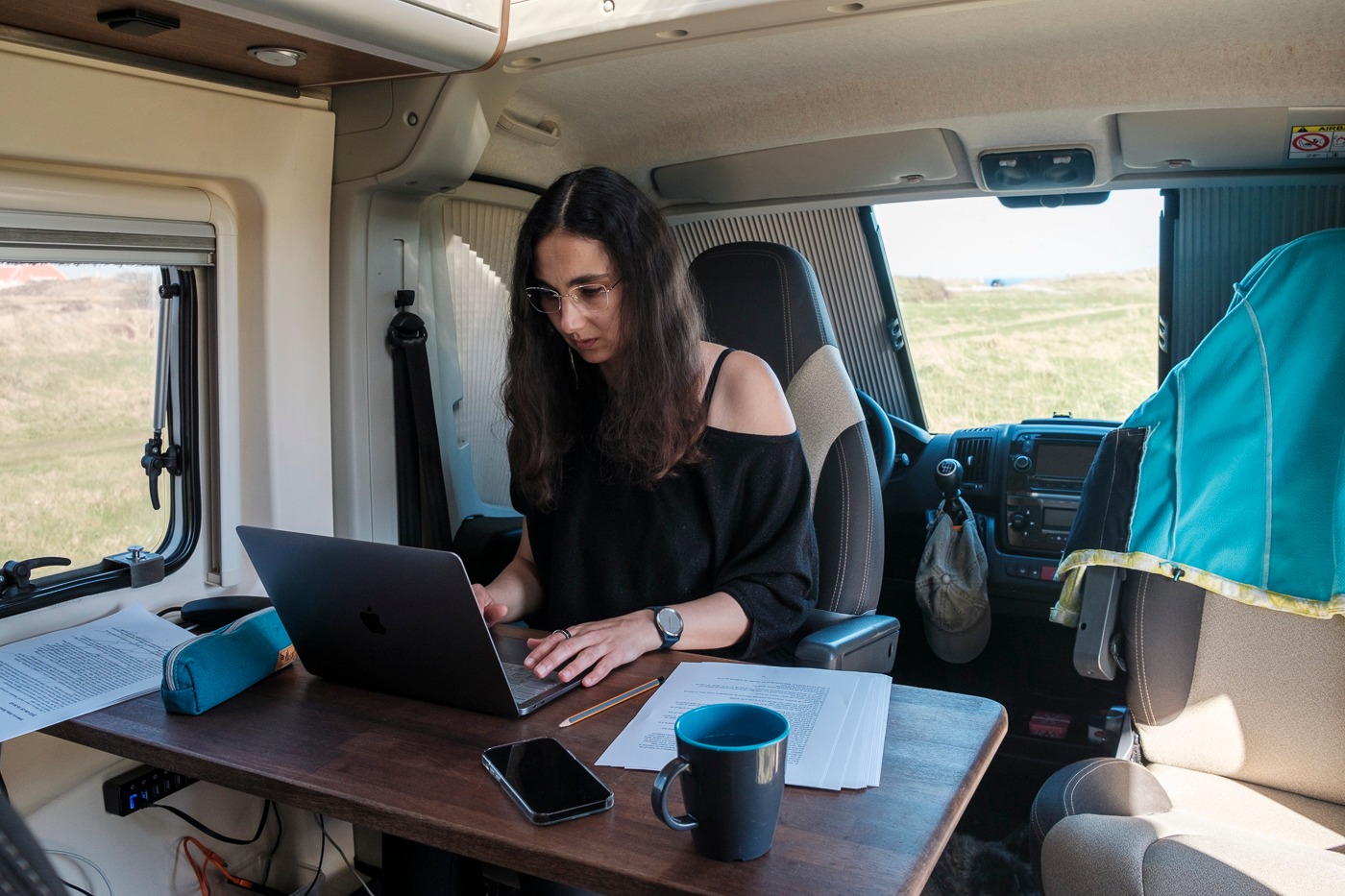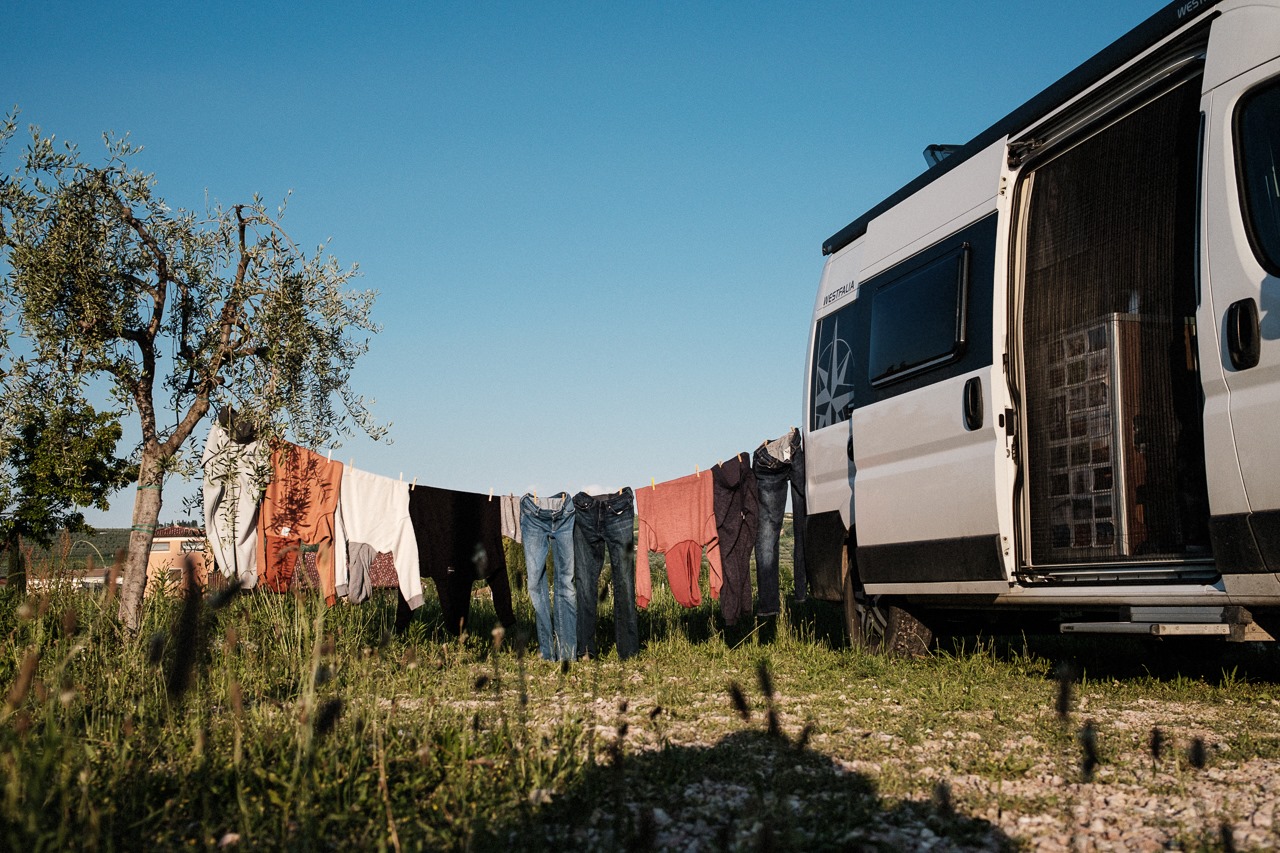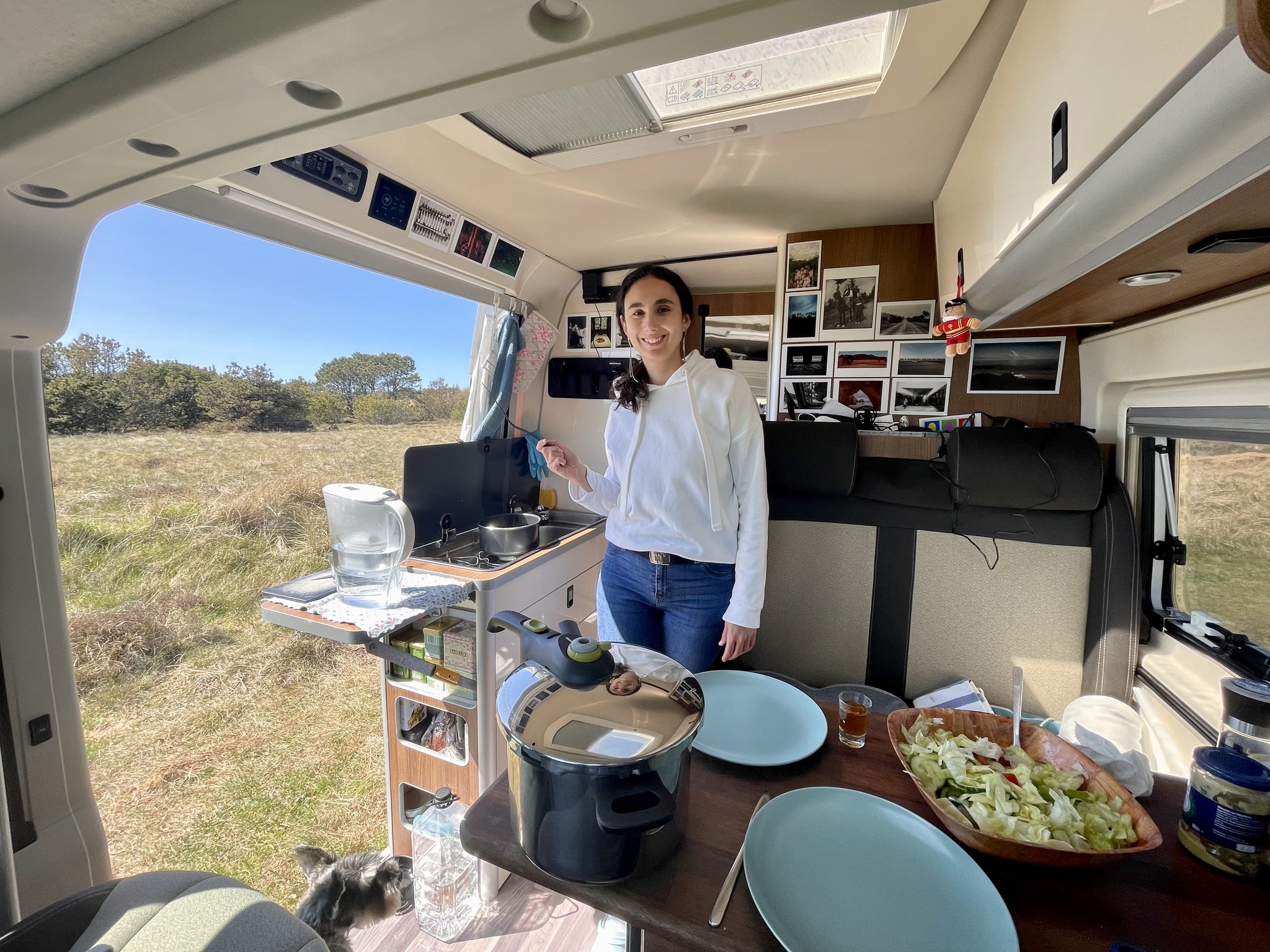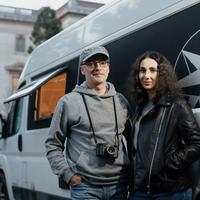
Elena Stancu at work in the couple's van - © Cosmin Bumbuț
A journalist and a photographer from Romania have been living in a van for ten years to be able to write their investigations on how life is in Romania and how expatriate Romanians live. They are Elena Stancu and Cosmin Bumbut: we met them
Elena Stancu and Cosmin Bumbut, a journalist and a photographer. For ten years they have lived in a van and travelled to document stories of Romanian life that few know or can imagine.
Elena worked for almost six years at Marie Claire magazine, where she was first editor, then deputy editor in chief. Cosmin took fashion and advertising photos until the age of 40, when he decided to work only on documentary projects. Their work brought them recognition and a good life, but real meaning was missing.
In November 2013, two journalism grants – one from the Carter Center and the BIRN Fellowship for Journalistic Excellence – gave them the courage to give up their rented studio apartment in Bucharest, move together into a van and begin a journey to investigate Romania.
They started with a project on the culture of violence which lasted over two years (“Scar”), then followed stories about life in Romanian prisons, families living in extreme poverty, discrimination, racism, the lack of medicines in Romanian hospitals.
These stories were also published in the book Acasa pe drum (“At home on the road”). They continued to live in their car, relying on reader donations and journalism grants, happy to have the privilege of being able to do their work across Romania, a country where it is not exactly easy to find the way to bring such projects to life.
In January 2019 they started working on Plecat (“Gone”), travelling across Europe to write and tell real stories about Romanian migrants.
Today, it has already been ten years since the couple moved into a van so they could do the job they always wanted to do.
Elena, how many kilometres have you travelled in ten years?
In November 2023 we celebrated ten years of life in the van. Over these years we have travelled approximately 140,000 km, including 80,000 in Europe. We parked in 387 spaces, which means we spent an average of 7.7 days in cities, villages, fields, forests, parks or beaches. We slept 3,000 nights in the car, which means 3,000 nights without paying for hotel accommodation or anything else.
We are not travellers in the pure sense of the term. It is not the most comfortable life, but we have safe and convenient accommodation wherever we want to go.
We need time to document complex issues and understand all the shades of gray that make up reality. This life has given us the privilege of working only on topics we believe in and being able to stay in one place until we finish our investigation. Now, for example, we are in the Netherlands to document the lives of young Romanians who study here. We park where the students live to be close to them, but since it is forbidden to sleep in the van here, we are sometimes also forced to hide and often to change places.
So you are still “At home on the road”, which is also the title of one of your projects, followed by Plecat. With the “Gone” project, you have so far been in ten countries and have documented the life of Romanians who emigrated to Spain as strawberry pickers, of Romanian carers in Italy, seasonal workers in Germany, farmers in Norway, musicians in Netherlands, naval electricians building ships in Denmark, doctors and medical nurses in England and Italy, Romanian researchers in Sweden and so on. In your experience, is there anything that somehow unites all these communities and places where Romanians live and work? Is there a common element, typical of the Romanian who has left Romania?
Actually no, the stories of Romanian expats have almost nothing in common. And that is exactly what we tried to show. Romania is the country with the highest percentage of emigration in Europe in relation to the population. Officially, there are 5.7 million Romanians who have emigrated.
We understood, however, that the Romanian state does not have the means and method necessary to provide real data. In Spain, for example, of the million Romanians who have emigrated since 2014, today there are less than half a million. This is because, with entry into the European Union and the abolition of travel restrictions, Romanians began to choose destinations such as England and Germany, and the Romanian state no longer followed the migration dynamics. It is not even interested in doing so, because the situation is constantly evolving. Romanian embassies abroad are overworked, as are the consulates.
Suffice it to say that in Germany, for a diaspora of almost one million Romanians, there is only one embassy and two consulates. The state does not know the real situation of Romanians who have emigrated abroad, who they are and what they have to face. Their problems and stories are very different.
Seasonal workers leave because they have no other way to earn a living. The same goes for dock workers who left for Denmark. After the Mangalia naval port closed, they found themselves in their 50s without many job opportunities and had to leave. They have no intention of integrating into Denmark and would gladly return home if there were other possibilities.
On the other hand, young Romanians who go to study in the Netherlands make this choice due to the variety of opportunities available to them and may not even return. The stories are therefore very different.
Some Romanian carers told us that for them Italy was an escape from domestic violence. The diaspora is truly another Romania that needs to be explored and understood.
Your investigations document the lives of Romanians beyond the figures, with true stories, photos, testimonies: have you ever seen concrete consequences after publication?
We were contacted by a Romanian politician who was interested in designing a programme for seasonal workers. Then we were invited by the European Council to talk about the situation of Romanian migrants. The UK government agency has also asked us for help in reporting low wages for foreign workers abroad. Of course, we are open to talking to anyone who wants to make a difference.
But what we hope is that our investigations will have a much more profound effect. May they build bridges between the Romanians who have left and those who stayed. And to dispel the myths and prejudices that some have about others. Not a month goes by without us receiving messages from people thanking us because they found themselves in our stories or because, thanks to our stories, they were able to better understand the situation of their neighbours and people who live in different social contexts. At the Filit literary festival in Iasi, for example, three or four of the young people who read our series on Romanian carers in Italy had their distant mothers doing this very job. It was interesting for them to see themselves in the stories and, at the same time, realise that they are not alone.
What you do therefore goes beyond a simple journalistic approach...
Yes, what we do has little to do with so-called news. We go into the depth of the history and the problem. We talk about identity, about transgenerational traumas, about how these traumas are transferred from one generation to another. And we too ask ourselves: but what are we actually doing and what can we call it? Journalism? Anthropology?
Project ideas come from your interests and curiosities. What do you see in the future?
We have an endless list of ideas and a lifetime would not be enough to bring them to fruition. In 2014 we put the “Gone” project on our agenda and we are still working on it. Ours is a long and tiring job not only because the themes are complex and very broad, but also because it is emotionally draining.
We live through our respondents, we empathise with their stories to understand them in depth. And sometimes we miss normal life. It is nice to know where you will sleep tonight, it is nice to meet up with friends, wash without problems. We have lost this normality. If you think about it, even Romanians in diaspora can choose to integrate into their community. We cannot do that, we integrate ourselves into people's lives and the stories we document. And because we have so many problems to solve every day, we cannot think of new projects. We still have another year of investigations ahead of us in France and Belgium, more than 100,000 photos to edit, then we will finally publish our book "Gone" and start again with a tour to promote it. Finally, and deservedly, we will return for a short break in our attic in Alba Iulia. This is the plan for the future.
Elena and Cosmin have so far made two documentary films: Rezidentele (The Residents) about Romania's first centre for female prisoners with mental health problems and Ultimul caldărăr (“The Last Caldărăr”) which tells the story of a young Roma family travelling to France to recover scrap metal in landfills. The film won, among others, the Special Prize at the Millenium International Documentary Film Festival Brussels 2017, the Picture Award at the Docuart Film Festival 2016 and was selected at Making Waves New York 2017 and at the Let's CEE Film Festival in Vienna 2018.
They published the book Acasa pe drum (At home on the road) and their stories are available on the website https://teleleu.eu/









 To Top
To Top